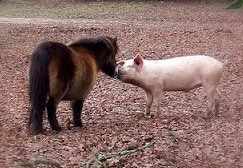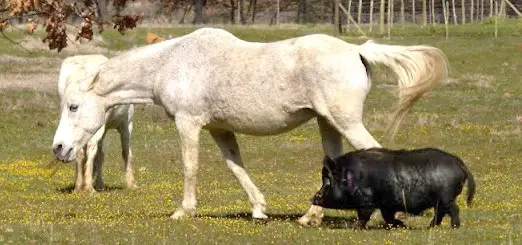I’ve been thinking a lot recently about whether horses and pigs make good field mates or not (in part because I think pigs are cute and want to get one). I’ve noticed that you often see horses happily grazing with a variety of animals such as sheep, goats, donkeys, and even alpacas but rarely pigs. This started me thinking about whether or not they should be kept together or if I should get another horse instead!
Anyway, to cut a long story short I researched the question, as well as speak to owners who had kept them together, and was very surprised by what I found, and I’m sure you will be too.
Can horses and pigs live together? Horses and pigs are very different animals that don’t have a lot in common, they don’t understand each other’s body language and won’t form emotional bonds so generally don’t make good companions. If you do want to keep both horses and pigs though it’s best to not keep them in the same field.
Are horses scared of pigs?
Being flight animals horses and naturally scared of most things (from sensible things such as the sound of gunshots or the bizarre plastic bag) but three things they’re scared of the most are sudden noises, sudden movement, and things they’ve never seen before. When you consider that pigs can be quite loud and be unpredictable in their moves I think it’s safe to say that while not all horses are, most will be scared of pigs, especially if they encountered them before.
When researching this article I spoke to one owner who’d kept her horse at a yard that had a pig and she told me about an incident where the pig had escaped his field and wandered into the arena. This in itself wasn’t a problem, the problem was that the owner I spoke to was exercising her horse at the time and the pig made a beeline straight for them. This spooked the horse who, petrified, took off as fast as he could, with the rider clinging on for dear life. I don’t know if the pig thought she was playing but he chased after them, terrifying the horse even further. While this was the only story like this I heard it’s a good example of just how frightened horses can be of pigs.
Can horses and pigs live together?
In researching this article I spoke to dozens of horse owners who kept or had kept, at least one pig with their horses without any problems. That said though, I spoke too far more owners who’d hadn’t been so lucky keeping their horses near to pigs. I know that sounds like I’m evading answering the question but I’m just saying that there will always be an exception to every rule and that just because you can or can’t do something it doesn’t mean it will always apply.
Anyway back to the question of whether horses and pigs can live together (see I’m not trying to evade answering). The problem with keeping horses and pigs is that they are both very different animals and have different needs which can make it difficult for them to get on. Fundamentally horses prefer the company of other grazing animals such as sheep, alpacas, cows, and of course other horses. Pigs, being noisy foragers instead of grazers, have a tendency to disrupt the harmony horses prefer to live in.
That doesn’t mean that they can’t live together with a fence separating them, just make sure it’s pig proof though as, from what other owners have said, pigs have little regard for some fencing.
What you need to consider before putting horses and pigs together
Now that we’ve established that, if done properly, you can keep horses and pigs together (albeit divided by a fence) there are a few things that you need to consider before introducing them to each other on a permanent basis.
Horses have a sensitive sense of smell
While pigs have an unfair reputation for being dirty animals there’s no denying that they do have a distinct aroma, even if they’re really clean. This is even more true of male pigs because they have two compounds (skatole and androstenedione) in their fat that cause their pungent odor.
I know a lot of non-horsey people will say that horses smell too (but let’s be honest that’s a nice smell) but the problem with the aroma of pigs is that horses don’t tend to like the smell. Of course, this isn’t true of every horse but the majority of owners I spoke to said that more than anything their horses hate the smell of pigs and would immediately back away as soon as they smelt them, even if they could see the pigs.
Horses can be aggressive towards pigs
Horses aren’t prone to sudden, unprovoked, outbursts of aggression but pigs aren’t good at reading a horse’s body language so can easily miss the signs that the horse is getting agitated. This can sometimes lead to the horse kicking the pig out of frustration which can have catastrophic consequences for the pig if the horse is wearing shoes or kicks hard.
I spoke to one owner who kept horses and pigs together but never put them in the same pasture, although she did occasionally put her Shetland Pony in with the pigs. Generally, they were fine together but on one occasion the pony decided to kick one of the pigs, luckily the Shetland didn’t have shoes but he still managed to kick the pig into a double barrel roll. Thankfully though the pig got up again and just shrugged the whole incident off.
Pigs like to dig
Let’s be honest pigs are known for their love of digging around in the dirt and mud with their snouts in search of food, this is one of the reasons why they’re regularly used to find truffles (although it’s not uncommon for the pigs to eat these expensive delicacies). While this might not seem like an issue, if the ground is loose, pigs can dig pretty big ditches in search of plant roots which can be hazardous to horses if they put a foot in the hole.
If you’re trying to maintain your horse’s pasture, having pigs digging whopping great holes everywhere isn’t going to help.
Risk of disease
There are plenty of diseases that animals can pass to each other but the main thing you need to be careful of with horses and pigs is salmonella. Pigs are one of the main carriers of salmonellosis (the bacteria that causes salmonella) and can easily pass it to horses, as well as to humans.
Salmonella is an intestinal disease that can cause colic, diarrhea, lethargy, chills, and fever in horses, but thankfully it’s not an airborne disease. Instead, it’s mainly transmitted through eating (or drinking) material that has been contaminated by the pig’s feces. This is another reason why it’s not advisable to let your horse and pig share the same pasture or water trough.
Can horses and pigs learn to get on?
Horses are generally scared of pigs but that doesn’t mean to say that, over time, they can’t learn to get along with them, or even just tolerate them. This, of course, isn’t true of all horses though, there will always be some that just won’t tolerate pigs in any way at all.
If you want to desensitize your horse to pigs then, like everything else, it’s best to do it slowly and at your horse’s pace. You can read more about helping horses overcome their fears in this article.
Conclusion
The thing I learned from researching this article was that while some horses and pigs will happily cohabit in the same field it’s generally better to have some sort of divider between the two of them. Then of course there are some horses who’d prefer the divider to be a few hundred miles!
I hope you found this article helpful. If you did I’d be grateful if you could share it please as it would really help me.
Recommended products
Over the years I have tried hundreds of different horsey products, from various blankets and halters to different treats. Some I’ve loved, others I’ve hated but I thought I’d share with you my top all-time favorite products, the ones I never leave the yard without. I’ve included links to the products (which are in no particular order) that I really think are great.
- Horse Knots by Reference Ready – If you’re like me and enjoy pocket reference guides then you’ll love this knot tying guide. These handy cards can easily fit in your pocket or attach to the saddle for quick reference. They’re waterproof, durable and are color coded to make them easy to follow.
- Mane ’n Tail Detangler – Even if you never show your horse you’ll need to detangle his tail from time to time (and possibly his mane too) which is always a challenging chore! I’ve found that if I run a little bit of detangler through my horse’s tails every few days it stops them from getting matted up and makes combing them easy, even if they’re coated in mud. I don’t know if I should admit to this or not but it also works wonders on my hair.
- TAKEKIT Pro clippers – Over the years I’ve tried a lot of different clippers and while some were obviously better than others I found these to be by far the best. They are heavier than a lot of other clippers but for me, that’s a good thing, it makes them feel more sturdy and hardwearing. On top of that they have a range of speeds so are just as good for clipping your horse’s back as they are his face. I also like the fact that they come in a handy carry case but that’s not for everybody. The company that makes them is super good and incredibly helpful too, a real bonus these days. The only thing I wasn’t keen on was the fact that it doesn’t come with any oil, but that’s not a major problem as it’s not difficult to buy lubricant.
- Shire’s ball feeder – There are so many boredom buster toys out there but I like to use these every day, regardless of whether or not my horses are bored. I find that it helps to encourage my horses to problem solve by rewarding them with treats (or pieces of fruit) but it also mimics their natural grazing behavior which helps to keep them calm and de-stressed.
- Horse safe mirror – This is a strange one that many people are surprised about but I like to put horse safe mirrors in the trailers as well as in the quarantine stalls. It helps to prevent the feeling of isolation by giving the impression of other horses being around. Being herd animals horses can get extremely stressed when they feel that they’re on their own but with these stick-on mirrors, they believe that at least one other horse is with them.
- Rectal thermometer – I know this isn’t glamourous at all but it’s vital for your horse’s well-being to be able to check their temperature and a rectal thermometer is the easiest way of doing this which is why I’ve added it to the list.
Shopping lists
I’ve also put together a few shopping lists of essential items that I’ve found helpful over the years. I’ve broken the lists down into different categories rather than put everything in one massive list 😉



